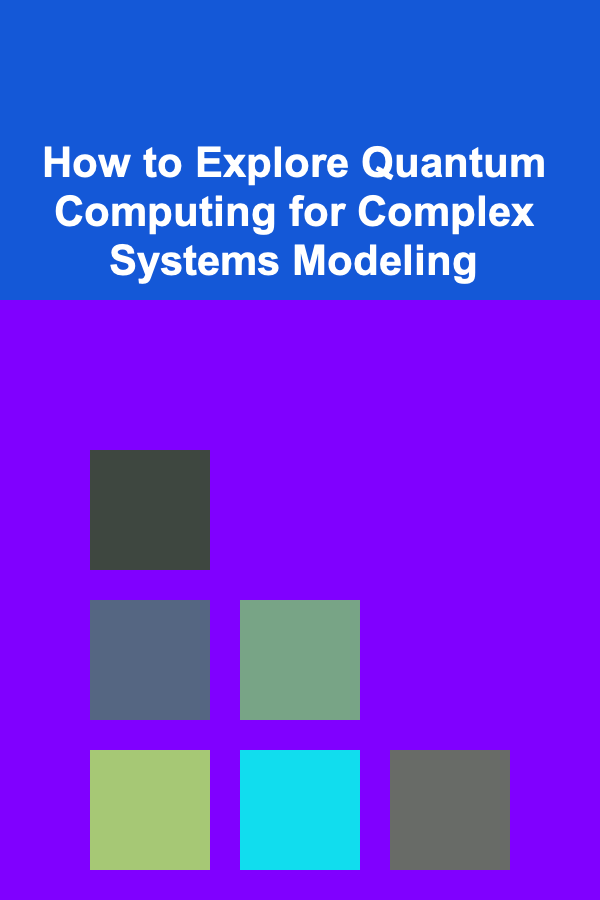
How to Explore Quantum Computing for Complex Systems Modeling
ebook include PDF & Audio bundle (Micro Guide)
$12.99$9.99
Limited Time Offer! Order within the next:

Quantum computing is an emerging field that promises to revolutionize industries across the globe, from cryptography to artificial intelligence. One of the most exciting areas of application for quantum computing is complex systems modeling. Complex systems are systems with many interacting components, where the behavior of the system as a whole is difficult to predict from the behavior of individual components. This includes everything from weather forecasting to biological networks, from social systems to financial markets.
This article will delve into how quantum computing can be used for modeling complex systems, explore its potential, and provide a roadmap for exploring and utilizing quantum computing in this domain.
Introduction to Quantum Computing
At its core, quantum computing is fundamentally different from classical computing. Classical computers use bits to represent data, which can exist in one of two states: 0 or 1. Quantum computers, on the other hand, use quantum bits or qubits. A qubit can exist not only in states 0 or 1 but also in a superposition of both states simultaneously. This property of qubits allows quantum computers to process vast amounts of information in parallel, making them potentially much more powerful than classical computers for certain types of problems.
The power of quantum computing arises from several phenomena in quantum mechanics, including superposition, entanglement, and quantum interference. These properties allow quantum computers to perform computations that would be practically impossible for classical computers to handle, especially in the case of problems involving complex, high-dimensional data.
Superposition
Superposition allows a quantum system to be in multiple states at the same time. For example, a qubit can represent both 0 and 1 simultaneously. This enables quantum computers to explore many possible solutions in parallel, which is a major advantage when dealing with complex systems where numerous variables and interactions must be considered.
Entanglement
Entanglement is a phenomenon where two or more qubits become linked in such a way that the state of one qubit can depend on the state of another, even if they are far apart. This allows for the creation of highly correlated systems that can be manipulated and measured in a way that classical systems cannot replicate.
Quantum Interference
Quantum interference refers to the phenomenon where the probabilities of different outcomes can interfere with each other, leading to constructive or destructive interference. Quantum algorithms leverage interference to amplify the probability of correct solutions and reduce the probability of incorrect solutions, which is particularly useful in optimization problems.
Why Quantum Computing is Important for Complex Systems Modeling
Complex systems are often characterized by the following features:
- Nonlinearity: Small changes in one part of the system can lead to large, unpredictable changes in the whole system.
- Emergence: The system exhibits behaviors that cannot be predicted from the behavior of individual components.
- High-dimensionality: The system may have many interacting components or variables.
- Interdependence: The components of the system interact in intricate ways, often leading to feedback loops and other complex dynamics.
Modeling such systems using classical methods is often computationally expensive or impractical due to the sheer number of variables involved. For example, simulating the behavior of molecules or proteins requires accounting for the interactions of thousands of atoms, which is a problem that grows exponentially as the size of the system increases.
Quantum computing, with its ability to represent and manipulate complex states in parallel, is well-suited to handle such high-dimensional and nonlinear problems. Additionally, quantum algorithms like Grover's algorithm (for search problems) and the Quantum Approximate Optimization Algorithm (QAOA) show promise in addressing complex optimization problems, which are ubiquitous in complex systems modeling.
Key Areas Where Quantum Computing Can Be Applied in Complex Systems Modeling
-
Quantum Chemistry and Molecular Simulation
One of the most promising areas for quantum computing in complex systems modeling is quantum chemistry. Traditional methods for simulating molecular systems become increasingly inefficient as the size of the system grows. This is because the number of variables involved in simulating a system of interacting particles grows exponentially. Quantum computing, on the other hand, is naturally suited to simulate quantum mechanical systems due to its inherent quantum nature.
Quantum computers can model the interactions between atoms and molecules at a level of detail that classical computers cannot, potentially leading to breakthroughs in drug discovery, materials science, and energy storage. For example, simulating the behavior of molecules like proteins or complex organic compounds can help researchers design new drugs more efficiently, or predict the properties of materials before they are synthesized.
-
Optimization Problems
Many complex systems involve optimization problems, where the goal is to find the best configuration or solution from a large set of possibilities. Classical algorithms often struggle with large-scale optimization problems, as the number of possible solutions grows exponentially.
Quantum computing offers a number of algorithms designed to solve optimization problems more efficiently. The Quantum Approximate Optimization Algorithm (QAOA) is one such algorithm that has shown promise in tackling combinatorial optimization problems. These problems arise in a variety of fields, including logistics, scheduling, and financial modeling, all of which are areas where complex systems modeling is crucial.
-
Climate Modeling and Weather Forecasting
Predicting the weather and modeling climate change are complex tasks due to the highly nonlinear and interconnected nature of the Earth's climate system. Classical models of weather forecasting often rely on numerical simulations that require vast computational resources and are limited by the precision and accuracy of the models themselves.
Quantum computing could potentially provide more accurate models by simulating the interactions of atmospheric particles and other variables at a fundamental quantum level. While this is still a long way off, the potential to model large-scale systems with greater accuracy could help improve weather predictions and our understanding of climate dynamics.
-
Financial Systems and Risk Analysis
Financial markets are highly complex systems, with countless variables and feedback loops that make predicting market behavior challenging. Classical models of financial systems, such as the Black-Scholes model for options pricing, rely on simplifying assumptions that may not fully capture the complexities of the real world.
Quantum computing could provide a way to model these systems more accurately, by simulating the interactions of various factors that influence the market. For example, quantum machine learning could be used to identify patterns in financial data that would be difficult for classical algorithms to detect. Quantum algorithms could also be used to optimize portfolios or assess risk in ways that are currently infeasible with classical methods.
-
Biological Systems and Neural Networks
Biological systems, such as the human brain or ecosystems, are incredibly complex and difficult to model due to the vast number of interacting components and the nonlinear nature of their behavior. While classical neural networks have made significant strides in mimicking certain aspects of biological intelligence, they are still limited by the computational resources available.
Quantum computing could offer a new approach to modeling biological systems by simulating quantum mechanical processes that underlie biological phenomena. This could lead to advances in understanding brain function, the spread of diseases, or the behavior of ecosystems. Quantum neural networks are a particularly promising area of research, as they may offer the potential for more powerful machine learning models.
How to Get Started with Quantum Computing for Complex Systems Modeling
-
Learn the Basics of Quantum Computing
To explore quantum computing for complex systems modeling, you must first have a solid understanding of quantum mechanics and quantum computing fundamentals. Several resources are available for beginners, such as online courses, textbooks, and educational videos. Topics to cover include:
- Quantum mechanics (superposition, entanglement, etc.)
- Qubits and quantum gates
- Quantum algorithms (e.g., Grover's algorithm, Shor's algorithm)
- Quantum programming languages (e.g., Qiskit, Cirq)
-
Get Hands-On with Quantum Programming
Several platforms allow you to experiment with quantum programming in a hands-on manner. IBM's Qiskit and Google's Cirq are two of the most popular quantum programming frameworks, and both offer cloud-based simulators and access to real quantum processors. Experimenting with these platforms will allow you to gain practical experience in quantum programming and better understand how quantum algorithms can be applied to real-world problems.
-
Study Quantum Machine Learning
Quantum machine learning (QML) is a rapidly growing field that combines quantum computing with machine learning. QML algorithms have the potential to outperform classical machine learning algorithms, especially in tasks such as pattern recognition, optimization, and large-scale data analysis. Learning the basics of QML and experimenting with existing quantum machine learning models can give you insights into how quantum computing can be applied to complex systems modeling.
-
Collaborate with Experts
Quantum computing is a highly specialized field, and it is essential to collaborate with experts who have experience in both quantum computing and complex systems modeling. Universities, research institutions, and tech companies are actively working on advancing quantum computing, and many offer collaboration opportunities for researchers in related fields. Building connections with experts can provide valuable insights and help you stay on the cutting edge of quantum computing developments.
-
Stay Up to Date with Research
The field of quantum computing is evolving rapidly, with new research and breakthroughs emerging regularly. Staying updated with the latest developments in quantum algorithms, hardware, and applications will help you remain informed about the state of the art and identify new opportunities for applying quantum computing to complex systems modeling. Journals, conferences, and online communities are excellent resources for keeping up with the latest trends in quantum computing.
Conclusion
Quantum computing has the potential to transform complex systems modeling by offering new ways to simulate and optimize systems that are currently intractable with classical computers. While quantum computing is still in its infancy, the progress made so far is promising, and the field is poised for significant advancements in the coming years. By gaining an understanding of quantum computing fundamentals, experimenting with quantum programming, and collaborating with experts in the field, you can start exploring the exciting possibilities that quantum computing offers for modeling complex systems.
As quantum hardware improves and quantum algorithms become more refined, we can expect quantum computing to become an indispensable tool for solving some of the most challenging problems in complex systems modeling. The future of quantum computing in this domain is bright, and those who invest in learning and exploring this field now will be at the forefront of this technological revolution.

How to Ensure Your Home Security System Works During Power Outages
Read More
How to Increase Home Rental Property Profitability Through Tax Deductions
Read More
How to Profit from Deep Learning: Easy Ways to Start
Read More
How to Sort and Store Seasonal Items in Your Garage
Read More
How to Manage Social Media in Dating
Read More
How To Identify Birds by Their Size Comparison
Read MoreOther Products

How to Ensure Your Home Security System Works During Power Outages
Read More
How to Increase Home Rental Property Profitability Through Tax Deductions
Read More
How to Profit from Deep Learning: Easy Ways to Start
Read More
How to Sort and Store Seasonal Items in Your Garage
Read More
How to Manage Social Media in Dating
Read More